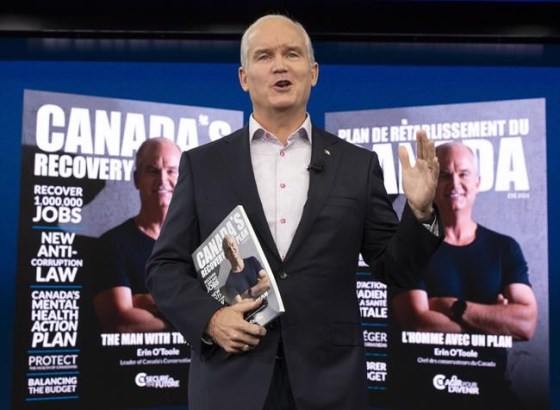The Macro
Let it be said that if — and this is a pretty huge “if” – China attempted to influence the outcome of Canada’s 2021 federal election, they might have had good reason.
Joking. There is no good reason for any foreign country to meddle in the electoral affairs of another country. But there is little doubt now that the Conservative party and its former leader, Erin O’Toole, are working surprisingly hard right now to convince people that China worked in the shadows of the Internet to hurt the party’s chances in 2021, when it (for the second election in a row) drew more voters but fewer seats — and lost again to the Liberals.
On the June 16 episode of CBC radio’s The House, O’Toole told host Chris Hall Chinese interference impacted the outcomes in at least nine seats, most of them in British Columbia’s lower mainland and Toronto.
O’Toole said the meddling — much of it involving fake narratives being pushed on WeChat, the social media platform developed by Chinese multinational Tencent — would not have changed the final vote. However, he insisted the interference was verified by an internal party review of election results.
On its face, it’s not such an outlandish allegation, given that Chinese cyber-terrorists are a real thing. This week, for example, Canadian federal security agencies confirmed an “unprecedented and indiscriminate exploitation” of Microsoft Exchange services by state-sponsored Chinese hackers.
Okay, so what did the Conservative internal review find? O’Toole would only describe vague references to “voter suppression” and constituents “being worried about appearing on a voters’ list as having voted if a Conservative won.” If you’re having trouble figuring out exactly what O’Toole is saying, you’re not alone.
CSIS, the national security agency, would not comment on O’Toole’s allegations other than to say it reports publicly any time there is “a substantial threat to a free and fair election.” And, in this instance, it made no such report.
Complicating matters, the Conservative HQ would not offer any additional information, repeatedly refusing comment to CBC and to Politico, which, earlier in June, was chasing the same story.
So, what in the Tory-blue blazes is going on? You might remember that the Conservatives under O’Toole demonstrated a clear and persistent obsession with China in the 2021 election.

Then-Conservative leader Erin O’Toole on the campaign trail in August, 2021. (Ryan Remiorz / The Canadian Press files)
In a really swell bit of election analysis, rabble.ca found that the Conservative platform document — the one with a picture of O’Toole in a tight black T-shirt — referred to “China” or “Chinese” 41 times. As rabble detailed, the specific references included comments about China’s “growing authoritarianism” and its efforts to undermine “democratic norms, institutions, and the rule of law.”
“We must stand up to the Communist government of China,” the Tory campaign document noted. “The communist leadership represents a clear and rising threat to Canadian interests — and our values. They’ve abducted our citizens, targeted our economy, and intimidated members of the Chinese Canadian community.”
Many of you may also remember Tory MP Derek Sloan’s toxic attack on Dr. Theresa Tam, Canada’s chief public health officer, a year before the election. In April 2020, with the world still trying to come to grips with the global COVID-19 pandemic, Sloan slagged Tam and suggested she was actually an operative of the Chinese government: “We sent out an email today saying, does she work for Canada, or does she work for China?”
Some political columnists, such as the top-drawer Bruce Arthur in Toronto, immediately called out Sloan’s attack as an echo of talking points publicized by The Rebel, the dangerously alt-right website run by far-right attack-thingy Ezra Levant.
“A lot of [the Tory attack] is garden-variety anti-globalist conservatism, which is ironically at least partly an American import. But the smear against Tam was truly ugly stuff: tarring a Chinese-Canadian as a double agent,” Arthur wrote.
“The alt-right chop shop at The Rebel, run by the disgraced Ezra Levant, had already pushed it. On April 16, Levant started a petition to fire Tam, and wrote, in part, ‘whose side is she on, Canada’s or China’s WHO?’ Sloan wasn’t even original. If anything, he was late.”
It should be noted that many Conservatives believe China did play a role in the outcome of the election, although not the one O’Toole has claimed. More than a few Tories believe the Tory campaign torpedoed itself in key electoral battlegrounds with significant numbers of Chinese-Canadian voters.
Tory MP Kenny Chiu lost his Steveston-Richmond East seat in B.C. and immediately blamed the Tory campaign’s preoccupation with China. Chiu told CTV News the anti-Chinese campaign backfired. “I think there could be more proactive communication directly addressing Canadians of Chinese descent that we could have done.”
Which brings us back to O’Toole’s most recent attempt to demonize China.
What possible tactical advantage could the Tories be trying to create by doubling down on talking points that some of their own defeated candidates believe may have cost them seats?
Let’s try out one theory. The Conservative leadership contest continues to be dominated by MP Pierre Poilievre, who is seen as the clear favorite. A Leger poll released this week had him as the preferred choice of 44 per cent of Conservative voters; the next-closest challenger — former federal PC leader and Quebec premier Jean Charest — had only 14 per cent support.

Conservative leadership hopeful Pierre Poilievre takes part in the Conservative Party of Canada French-language leadership debate in Laval, Quebec on Wednesday, May 25, 2022. THE CANADIAN PRESS/Ryan Remiorz
If Poilievre wins, would he slip comfortably into the O’Toole talking points on China? Poilievre has been less strident on China but clearly sees the demonization of an easily demonized nation like China as something he could work with. But if that dampens support for the Tories among Chinese-Canadians and others who see it as offensive, what’s the end game?
The Conservatives are, it appears, headed further out on the right wing of Canadian politics. Once the party gets there, likely with Poilievre at the helm, it will stop worrying about currying the support of minorities and other groups that might be offended by their attacks on China, and start focusing its effort on growing its base of support among those Canadians who love a good China-bash.
Basic electoral demographics suggest this strategy, at first blush, is a loser. Conservative support is already concentrated in too few ridings to overcome the highly efficient Liberal vote. Moving further right may only serve to increase Tory pluralities in ridings they are already winning handily.
Either way, as Bette Davis urged us, fasten your seatbelts. It appears that once the Tory leadership race is over, we’ll be heading into an ugly and uncertain era of conservative politics.
|

